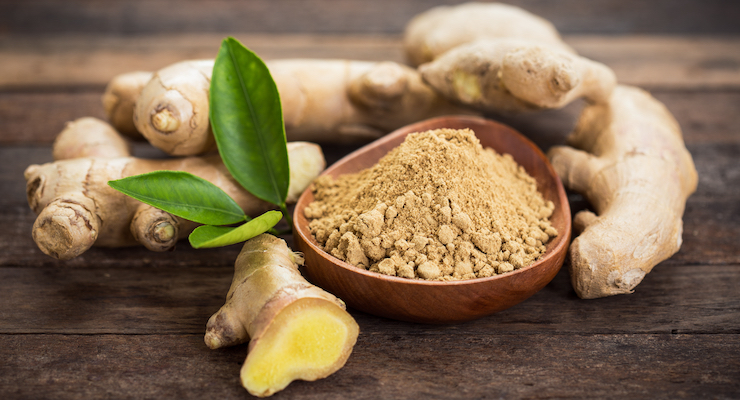06.14.21
Ingredient supplier DolCas Biotech announced that its ginger extract Ginfort was shown in a clinical study to significantly reduce a broad range of dyspepsia symptoms in chronic sufferers.
The study, which appeared in the Journal of Dietary Supplements, concluded that the all-natural high-gingeroids extract demonstrated positive capacity in a cluster of functional dyspepsia symptoms, which affect the upper digestive system, such as epigastric pain, burning, and an uncomfortable sense of fullness. FD affects close to 20% of the population, with no clear-cut conventional treatment, the authors of the study said. Lifestyle-related factors, including cigarette smoking, alcohol, stress, certain medications, infections, and obesity, could all affect this condition, which entails a dysfunction of the gut-associated nervous system and is believed to impair gastric motor function.
The randomized, double-blind, placebo-controlled study, was led by Sanjib Kumar Panda, PhD, at the Maharaja Agrasen Hospital in New Delhi, India. It included 57 participants suffering from FD, who were either administered 200 mg of Ginfort twice daily, or a matching placebo. Overall treatment efficacy was rated on a seven-point Likert scale where subjects were asked to complete a weekly questionnaire over the course of the 4-week trial, covering nine FD symptoms, including upper abdominal pain, upper abdominal discomfort, post-meal fullness, upper abdominal bloating, early satiety, excessive belching, nausea, vomiting, and heartburn.
At 2 weeks into the trial, 41% of the subjects in the Ginfort group reported a statistically significant positive response which was maintained throughout the trial period. Ginfort supplementation was found to be effective in 79% of the subjects, whereas the placebo was only found to be 21% effective. Moreover, the responder rate in the Ginfort group was 58% higher than placebo at visit 4.
By week four’s assessment, the collective elimination score for three major symptoms – postprandial fullness, upper abdominal bloating, and early satiation – was 64% for Ginfort subjects, whereas only 13% of the placebo group rated their symptoms as eliminated. Most of the nine individual symptoms also showed statistically significant rates of elimination over the placebo group. Examination of blood labs and vital signs also determined that Ginfort was effective and safe for FD treatment.
“Ginger has been revered as a food and medicinal since time immemorial,” Dr. Shavon Jackson-Michel, director of Medical & Scientific Affairs at DolCas Biotech, LLC, said. “The rhizome’s use in support of digestive health has been promising and anecdotally rewarding yet has evaded rigorous scientific evaluation in terms of producing consistently positive results.”
Ginfort was formulated based on a 2019 review article on the role of ginger in gastrointestinal disorders, which provided recommendations for increasing the stability and bioavailability of known ginger actives, specifically the volatile oils gingerols and shogaols.
Ginfort uses Aqueosome technology to deliver 26% of active gingeroid compounds, including the aforementioned gingerols and shogaols. Its proprietary solvent-free extraction process produces a powder from ginger oleoresin containing high concentrations of pure ginger polyphenols and essential oils in their native, naturally stable matrix, enabling low clinical doses, less restrictive storage conditions, and enhanced stability and bioavailability of the rhizome’s particularly volatile bioactives, the company said.
The study, which appeared in the Journal of Dietary Supplements, concluded that the all-natural high-gingeroids extract demonstrated positive capacity in a cluster of functional dyspepsia symptoms, which affect the upper digestive system, such as epigastric pain, burning, and an uncomfortable sense of fullness. FD affects close to 20% of the population, with no clear-cut conventional treatment, the authors of the study said. Lifestyle-related factors, including cigarette smoking, alcohol, stress, certain medications, infections, and obesity, could all affect this condition, which entails a dysfunction of the gut-associated nervous system and is believed to impair gastric motor function.
The randomized, double-blind, placebo-controlled study, was led by Sanjib Kumar Panda, PhD, at the Maharaja Agrasen Hospital in New Delhi, India. It included 57 participants suffering from FD, who were either administered 200 mg of Ginfort twice daily, or a matching placebo. Overall treatment efficacy was rated on a seven-point Likert scale where subjects were asked to complete a weekly questionnaire over the course of the 4-week trial, covering nine FD symptoms, including upper abdominal pain, upper abdominal discomfort, post-meal fullness, upper abdominal bloating, early satiety, excessive belching, nausea, vomiting, and heartburn.
At 2 weeks into the trial, 41% of the subjects in the Ginfort group reported a statistically significant positive response which was maintained throughout the trial period. Ginfort supplementation was found to be effective in 79% of the subjects, whereas the placebo was only found to be 21% effective. Moreover, the responder rate in the Ginfort group was 58% higher than placebo at visit 4.
By week four’s assessment, the collective elimination score for three major symptoms – postprandial fullness, upper abdominal bloating, and early satiation – was 64% for Ginfort subjects, whereas only 13% of the placebo group rated their symptoms as eliminated. Most of the nine individual symptoms also showed statistically significant rates of elimination over the placebo group. Examination of blood labs and vital signs also determined that Ginfort was effective and safe for FD treatment.
“Ginger has been revered as a food and medicinal since time immemorial,” Dr. Shavon Jackson-Michel, director of Medical & Scientific Affairs at DolCas Biotech, LLC, said. “The rhizome’s use in support of digestive health has been promising and anecdotally rewarding yet has evaded rigorous scientific evaluation in terms of producing consistently positive results.”
Ginfort was formulated based on a 2019 review article on the role of ginger in gastrointestinal disorders, which provided recommendations for increasing the stability and bioavailability of known ginger actives, specifically the volatile oils gingerols and shogaols.
Ginfort uses Aqueosome technology to deliver 26% of active gingeroid compounds, including the aforementioned gingerols and shogaols. Its proprietary solvent-free extraction process produces a powder from ginger oleoresin containing high concentrations of pure ginger polyphenols and essential oils in their native, naturally stable matrix, enabling low clinical doses, less restrictive storage conditions, and enhanced stability and bioavailability of the rhizome’s particularly volatile bioactives, the company said.




























